Reviewing Maple Leaf Empire: Canada, Britain, and the Two World Wars
VerifiedAdded on 2023/06/13
|7
|1668
|280
Essay
AI Summary
This essay provides an analysis of Jonathan Vance's 'Maple Leaf Empire,' which examines the evolving relationship between Canada and Great Britain from 1871 to 1946, focusing on the impact of the First and Second World Wars. Vance argues that Canadian national loyalty to the British Empire and Canadian pride were interdependent. The essay highlights how the book covers the historical military struggles based on cultural and familial links and a shared commitment to democratic ideals. It acknowledges the book's use of letters, images, and anecdotes to document the wartime experiences of Canadians, while also addressing criticisms regarding Vance's portrayal of Britishness and the limited inclusion of diverse perspectives. Ultimately, the essay underscores the book's contribution to understanding Canadian identity and the complex interplay between Canada and Britain during a transformative period.
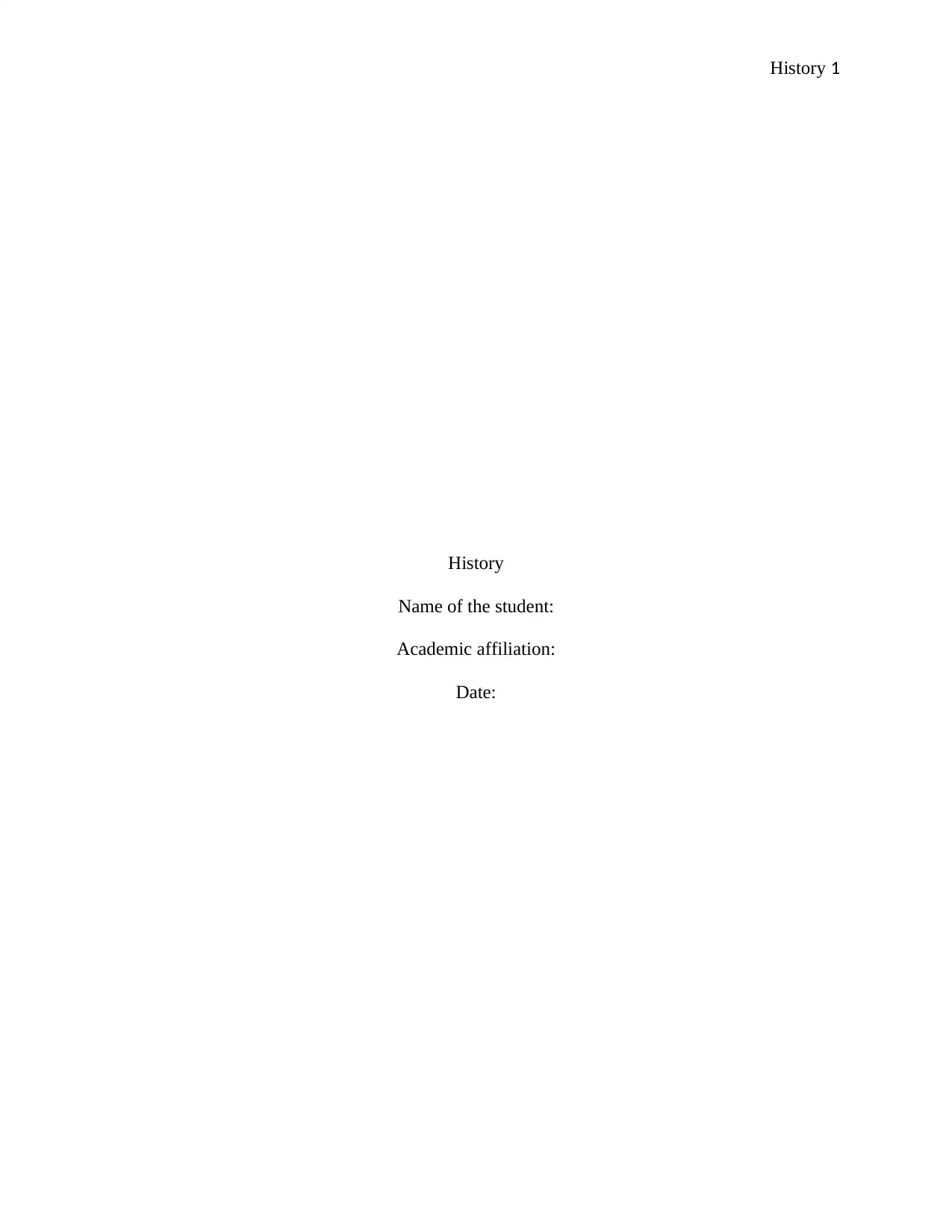
History 1
History
Name of the student:
Academic affiliation:
Date:
History
Name of the student:
Academic affiliation:
Date:
Paraphrase This Document
Need a fresh take? Get an instant paraphrase of this document with our AI Paraphraser
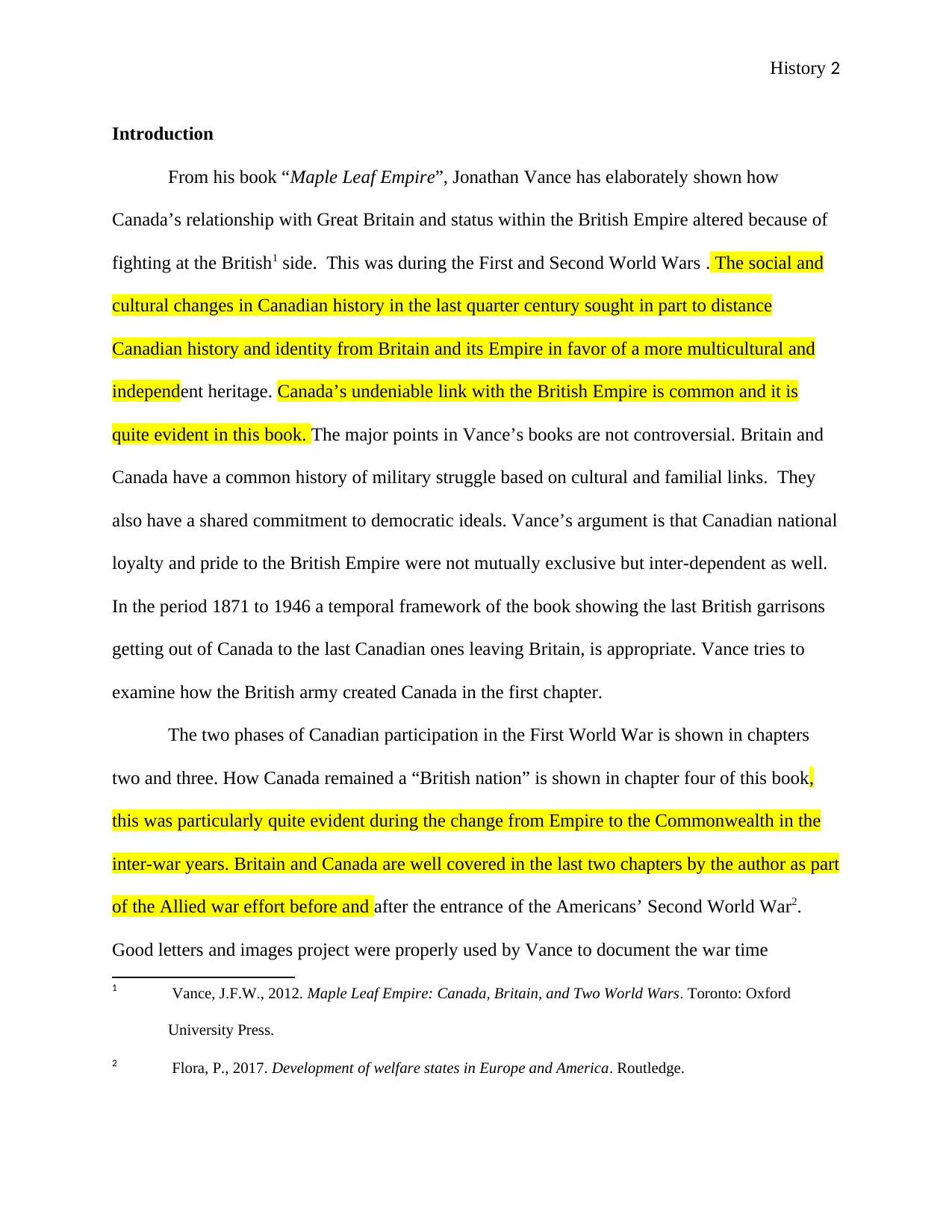
History 2
Introduction
From his book “Maple Leaf Empire”, Jonathan Vance has elaborately shown how
Canada’s relationship with Great Britain and status within the British Empire altered because of
fighting at the British1 side. This was during the First and Second World Wars . The social and
cultural changes in Canadian history in the last quarter century sought in part to distance
Canadian history and identity from Britain and its Empire in favor of a more multicultural and
independent heritage. Canada’s undeniable link with the British Empire is common and it is
quite evident in this book. The major points in Vance’s books are not controversial. Britain and
Canada have a common history of military struggle based on cultural and familial links. They
also have a shared commitment to democratic ideals. Vance’s argument is that Canadian national
loyalty and pride to the British Empire were not mutually exclusive but inter-dependent as well.
In the period 1871 to 1946 a temporal framework of the book showing the last British garrisons
getting out of Canada to the last Canadian ones leaving Britain, is appropriate. Vance tries to
examine how the British army created Canada in the first chapter.
The two phases of Canadian participation in the First World War is shown in chapters
two and three. How Canada remained a “British nation” is shown in chapter four of this book,
this was particularly quite evident during the change from Empire to the Commonwealth in the
inter-war years. Britain and Canada are well covered in the last two chapters by the author as part
of the Allied war effort before and after the entrance of the Americans’ Second World War2.
Good letters and images project were properly used by Vance to document the war time
1 Vance, J.F.W., 2012. Maple Leaf Empire: Canada, Britain, and Two World Wars. Toronto: Oxford
University Press.
2 Flora, P., 2017. Development of welfare states in Europe and America. Routledge.
Introduction
From his book “Maple Leaf Empire”, Jonathan Vance has elaborately shown how
Canada’s relationship with Great Britain and status within the British Empire altered because of
fighting at the British1 side. This was during the First and Second World Wars . The social and
cultural changes in Canadian history in the last quarter century sought in part to distance
Canadian history and identity from Britain and its Empire in favor of a more multicultural and
independent heritage. Canada’s undeniable link with the British Empire is common and it is
quite evident in this book. The major points in Vance’s books are not controversial. Britain and
Canada have a common history of military struggle based on cultural and familial links. They
also have a shared commitment to democratic ideals. Vance’s argument is that Canadian national
loyalty and pride to the British Empire were not mutually exclusive but inter-dependent as well.
In the period 1871 to 1946 a temporal framework of the book showing the last British garrisons
getting out of Canada to the last Canadian ones leaving Britain, is appropriate. Vance tries to
examine how the British army created Canada in the first chapter.
The two phases of Canadian participation in the First World War is shown in chapters
two and three. How Canada remained a “British nation” is shown in chapter four of this book,
this was particularly quite evident during the change from Empire to the Commonwealth in the
inter-war years. Britain and Canada are well covered in the last two chapters by the author as part
of the Allied war effort before and after the entrance of the Americans’ Second World War2.
Good letters and images project were properly used by Vance to document the war time
1 Vance, J.F.W., 2012. Maple Leaf Empire: Canada, Britain, and Two World Wars. Toronto: Oxford
University Press.
2 Flora, P., 2017. Development of welfare states in Europe and America. Routledge.
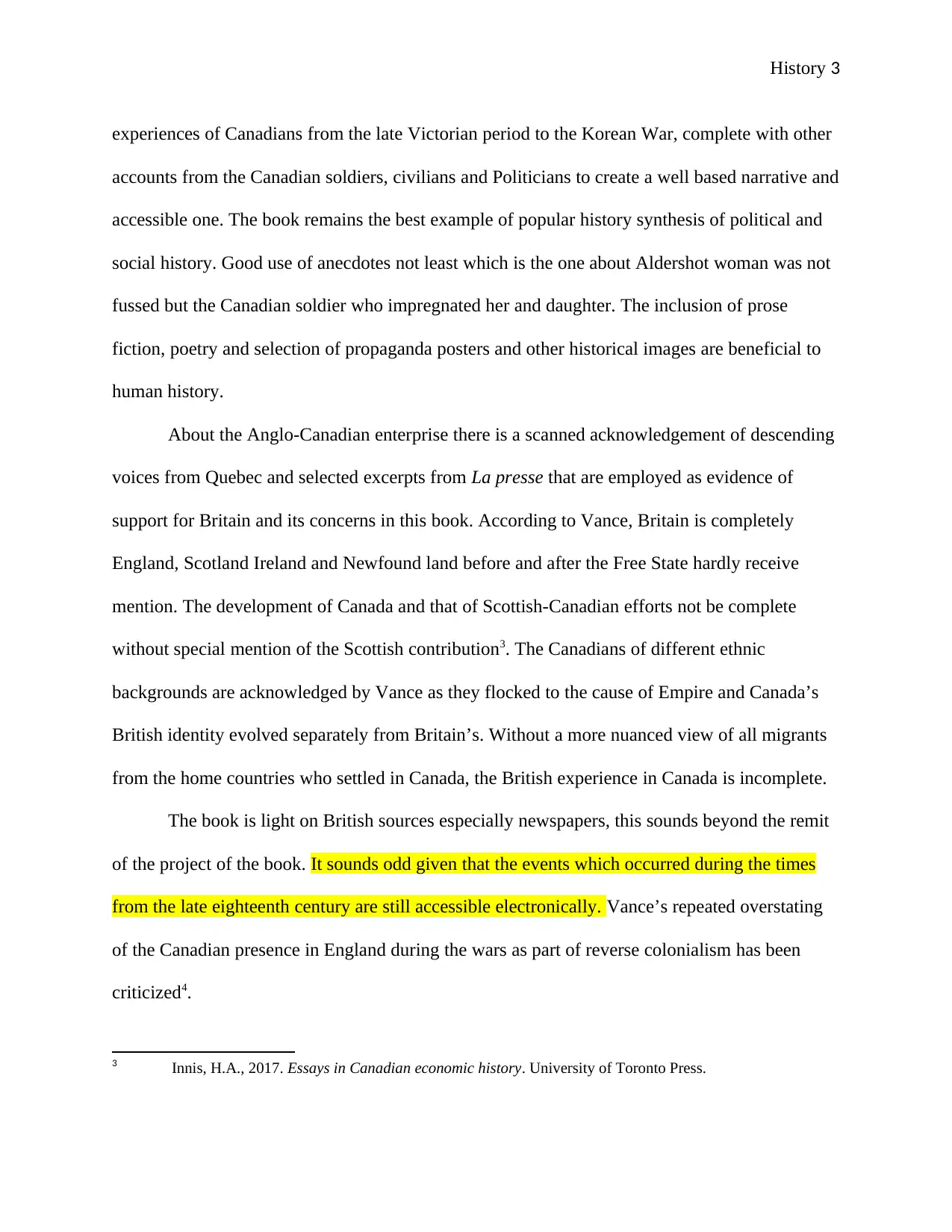
History 3
experiences of Canadians from the late Victorian period to the Korean War, complete with other
accounts from the Canadian soldiers, civilians and Politicians to create a well based narrative and
accessible one. The book remains the best example of popular history synthesis of political and
social history. Good use of anecdotes not least which is the one about Aldershot woman was not
fussed but the Canadian soldier who impregnated her and daughter. The inclusion of prose
fiction, poetry and selection of propaganda posters and other historical images are beneficial to
human history.
About the Anglo-Canadian enterprise there is a scanned acknowledgement of descending
voices from Quebec and selected excerpts from La presse that are employed as evidence of
support for Britain and its concerns in this book. According to Vance, Britain is completely
England, Scotland Ireland and Newfound land before and after the Free State hardly receive
mention. The development of Canada and that of Scottish-Canadian efforts not be complete
without special mention of the Scottish contribution3. The Canadians of different ethnic
backgrounds are acknowledged by Vance as they flocked to the cause of Empire and Canada’s
British identity evolved separately from Britain’s. Without a more nuanced view of all migrants
from the home countries who settled in Canada, the British experience in Canada is incomplete.
The book is light on British sources especially newspapers, this sounds beyond the remit
of the project of the book. It sounds odd given that the events which occurred during the times
from the late eighteenth century are still accessible electronically. Vance’s repeated overstating
of the Canadian presence in England during the wars as part of reverse colonialism has been
criticized4.
3 Innis, H.A., 2017. Essays in Canadian economic history. University of Toronto Press.
experiences of Canadians from the late Victorian period to the Korean War, complete with other
accounts from the Canadian soldiers, civilians and Politicians to create a well based narrative and
accessible one. The book remains the best example of popular history synthesis of political and
social history. Good use of anecdotes not least which is the one about Aldershot woman was not
fussed but the Canadian soldier who impregnated her and daughter. The inclusion of prose
fiction, poetry and selection of propaganda posters and other historical images are beneficial to
human history.
About the Anglo-Canadian enterprise there is a scanned acknowledgement of descending
voices from Quebec and selected excerpts from La presse that are employed as evidence of
support for Britain and its concerns in this book. According to Vance, Britain is completely
England, Scotland Ireland and Newfound land before and after the Free State hardly receive
mention. The development of Canada and that of Scottish-Canadian efforts not be complete
without special mention of the Scottish contribution3. The Canadians of different ethnic
backgrounds are acknowledged by Vance as they flocked to the cause of Empire and Canada’s
British identity evolved separately from Britain’s. Without a more nuanced view of all migrants
from the home countries who settled in Canada, the British experience in Canada is incomplete.
The book is light on British sources especially newspapers, this sounds beyond the remit
of the project of the book. It sounds odd given that the events which occurred during the times
from the late eighteenth century are still accessible electronically. Vance’s repeated overstating
of the Canadian presence in England during the wars as part of reverse colonialism has been
criticized4.
3 Innis, H.A., 2017. Essays in Canadian economic history. University of Toronto Press.
⊘ This is a preview!⊘
Do you want full access?
Subscribe today to unlock all pages.

Trusted by 1+ million students worldwide
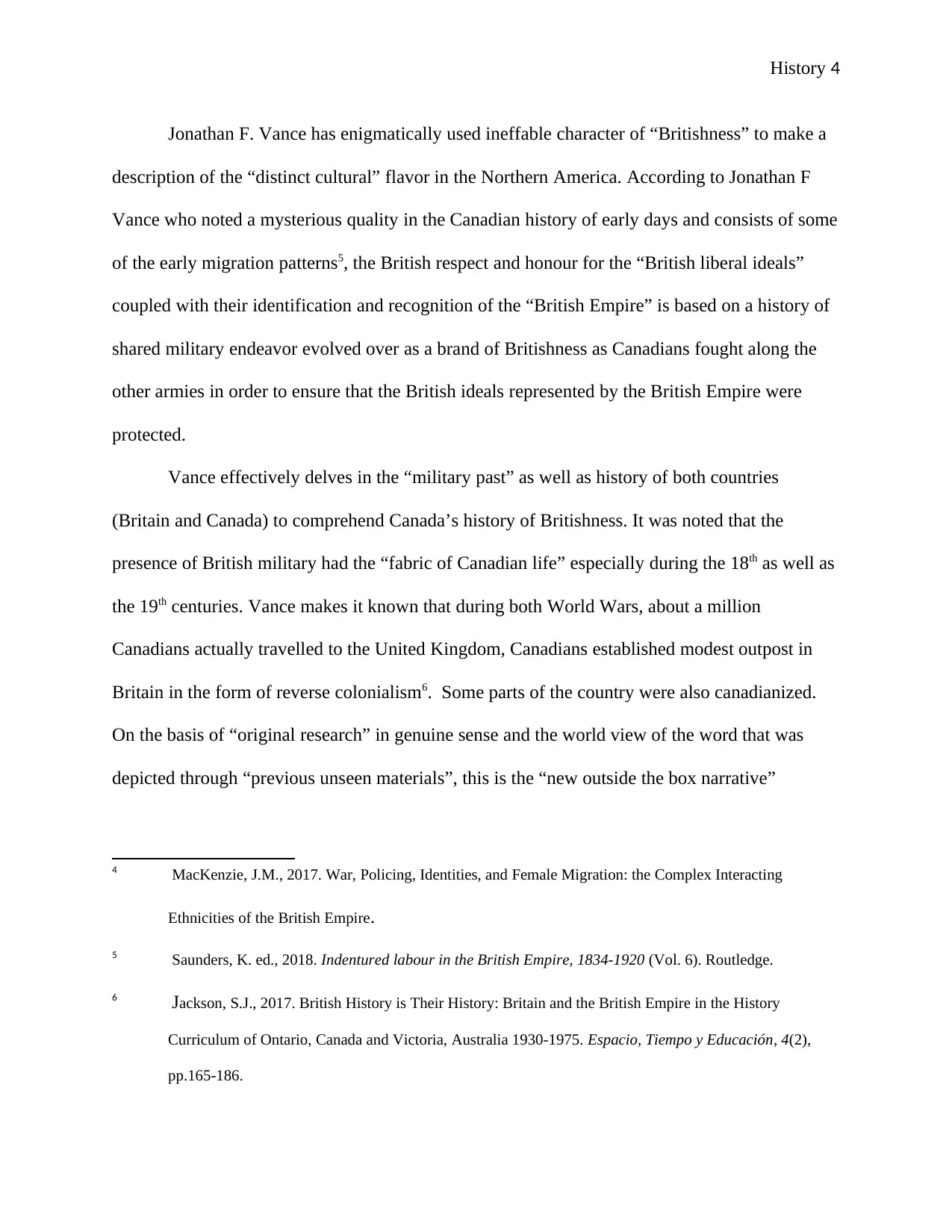
History 4
Jonathan F. Vance has enigmatically used ineffable character of “Britishness” to make a
description of the “distinct cultural” flavor in the Northern America. According to Jonathan F
Vance who noted a mysterious quality in the Canadian history of early days and consists of some
of the early migration patterns5, the British respect and honour for the “British liberal ideals”
coupled with their identification and recognition of the “British Empire” is based on a history of
shared military endeavor evolved over as a brand of Britishness as Canadians fought along the
other armies in order to ensure that the British ideals represented by the British Empire were
protected.
Vance effectively delves in the “military past” as well as history of both countries
(Britain and Canada) to comprehend Canada’s history of Britishness. It was noted that the
presence of British military had the “fabric of Canadian life” especially during the 18th as well as
the 19th centuries. Vance makes it known that during both World Wars, about a million
Canadians actually travelled to the United Kingdom, Canadians established modest outpost in
Britain in the form of reverse colonialism6. Some parts of the country were also canadianized.
On the basis of “original research” in genuine sense and the world view of the word that was
depicted through “previous unseen materials”, this is the “new outside the box narrative”
4 MacKenzie, J.M., 2017. War, Policing, Identities, and Female Migration: the Complex Interacting
Ethnicities of the British Empire.
5 Saunders, K. ed., 2018. Indentured labour in the British Empire, 1834-1920 (Vol. 6). Routledge.
6 Jackson, S.J., 2017. British History is Their History: Britain and the British Empire in the History
Curriculum of Ontario, Canada and Victoria, Australia 1930-1975. Espacio, Tiempo y Educación, 4(2),
pp.165-186.
Jonathan F. Vance has enigmatically used ineffable character of “Britishness” to make a
description of the “distinct cultural” flavor in the Northern America. According to Jonathan F
Vance who noted a mysterious quality in the Canadian history of early days and consists of some
of the early migration patterns5, the British respect and honour for the “British liberal ideals”
coupled with their identification and recognition of the “British Empire” is based on a history of
shared military endeavor evolved over as a brand of Britishness as Canadians fought along the
other armies in order to ensure that the British ideals represented by the British Empire were
protected.
Vance effectively delves in the “military past” as well as history of both countries
(Britain and Canada) to comprehend Canada’s history of Britishness. It was noted that the
presence of British military had the “fabric of Canadian life” especially during the 18th as well as
the 19th centuries. Vance makes it known that during both World Wars, about a million
Canadians actually travelled to the United Kingdom, Canadians established modest outpost in
Britain in the form of reverse colonialism6. Some parts of the country were also canadianized.
On the basis of “original research” in genuine sense and the world view of the word that was
depicted through “previous unseen materials”, this is the “new outside the box narrative”
4 MacKenzie, J.M., 2017. War, Policing, Identities, and Female Migration: the Complex Interacting
Ethnicities of the British Empire.
5 Saunders, K. ed., 2018. Indentured labour in the British Empire, 1834-1920 (Vol. 6). Routledge.
6 Jackson, S.J., 2017. British History is Their History: Britain and the British Empire in the History
Curriculum of Ontario, Canada and Victoria, Australia 1930-1975. Espacio, Tiempo y Educación, 4(2),
pp.165-186.
Paraphrase This Document
Need a fresh take? Get an instant paraphrase of this document with our AI Paraphraser
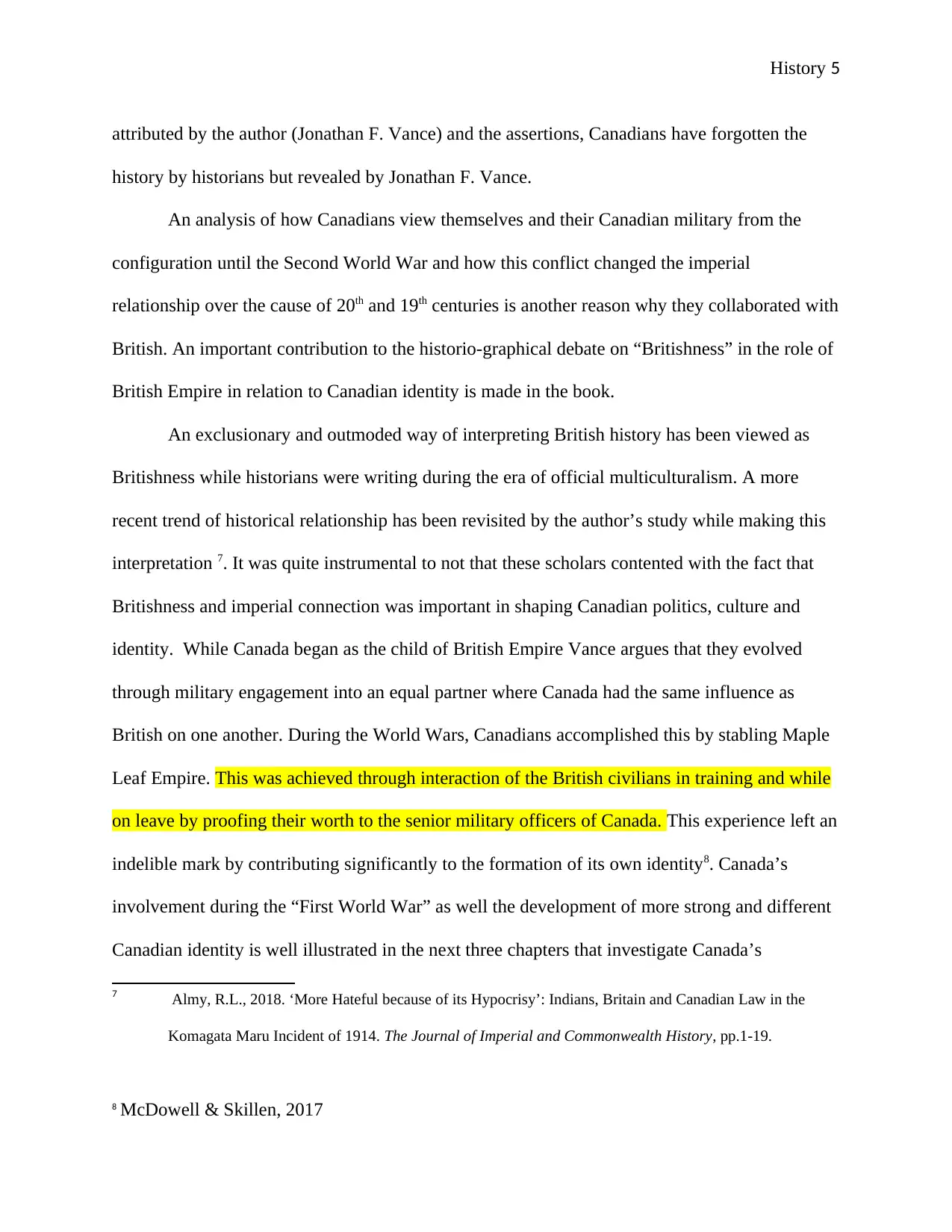
History 5
attributed by the author (Jonathan F. Vance) and the assertions, Canadians have forgotten the
history by historians but revealed by Jonathan F. Vance.
An analysis of how Canadians view themselves and their Canadian military from the
configuration until the Second World War and how this conflict changed the imperial
relationship over the cause of 20th and 19th centuries is another reason why they collaborated with
British. An important contribution to the historio-graphical debate on “Britishness” in the role of
British Empire in relation to Canadian identity is made in the book.
An exclusionary and outmoded way of interpreting British history has been viewed as
Britishness while historians were writing during the era of official multiculturalism. A more
recent trend of historical relationship has been revisited by the author’s study while making this
interpretation 7. It was quite instrumental to not that these scholars contented with the fact that
Britishness and imperial connection was important in shaping Canadian politics, culture and
identity. While Canada began as the child of British Empire Vance argues that they evolved
through military engagement into an equal partner where Canada had the same influence as
British on one another. During the World Wars, Canadians accomplished this by stabling Maple
Leaf Empire. This was achieved through interaction of the British civilians in training and while
on leave by proofing their worth to the senior military officers of Canada. This experience left an
indelible mark by contributing significantly to the formation of its own identity8. Canada’s
involvement during the “First World War” as well the development of more strong and different
Canadian identity is well illustrated in the next three chapters that investigate Canada’s
7 Almy, R.L., 2018. ‘More Hateful because of its Hypocrisy’: Indians, Britain and Canadian Law in the
Komagata Maru Incident of 1914. The Journal of Imperial and Commonwealth History, pp.1-19.
8 McDowell & Skillen, 2017
attributed by the author (Jonathan F. Vance) and the assertions, Canadians have forgotten the
history by historians but revealed by Jonathan F. Vance.
An analysis of how Canadians view themselves and their Canadian military from the
configuration until the Second World War and how this conflict changed the imperial
relationship over the cause of 20th and 19th centuries is another reason why they collaborated with
British. An important contribution to the historio-graphical debate on “Britishness” in the role of
British Empire in relation to Canadian identity is made in the book.
An exclusionary and outmoded way of interpreting British history has been viewed as
Britishness while historians were writing during the era of official multiculturalism. A more
recent trend of historical relationship has been revisited by the author’s study while making this
interpretation 7. It was quite instrumental to not that these scholars contented with the fact that
Britishness and imperial connection was important in shaping Canadian politics, culture and
identity. While Canada began as the child of British Empire Vance argues that they evolved
through military engagement into an equal partner where Canada had the same influence as
British on one another. During the World Wars, Canadians accomplished this by stabling Maple
Leaf Empire. This was achieved through interaction of the British civilians in training and while
on leave by proofing their worth to the senior military officers of Canada. This experience left an
indelible mark by contributing significantly to the formation of its own identity8. Canada’s
involvement during the “First World War” as well the development of more strong and different
Canadian identity is well illustrated in the next three chapters that investigate Canada’s
7 Almy, R.L., 2018. ‘More Hateful because of its Hypocrisy’: Indians, Britain and Canadian Law in the
Komagata Maru Incident of 1914. The Journal of Imperial and Commonwealth History, pp.1-19.
8 McDowell & Skillen, 2017
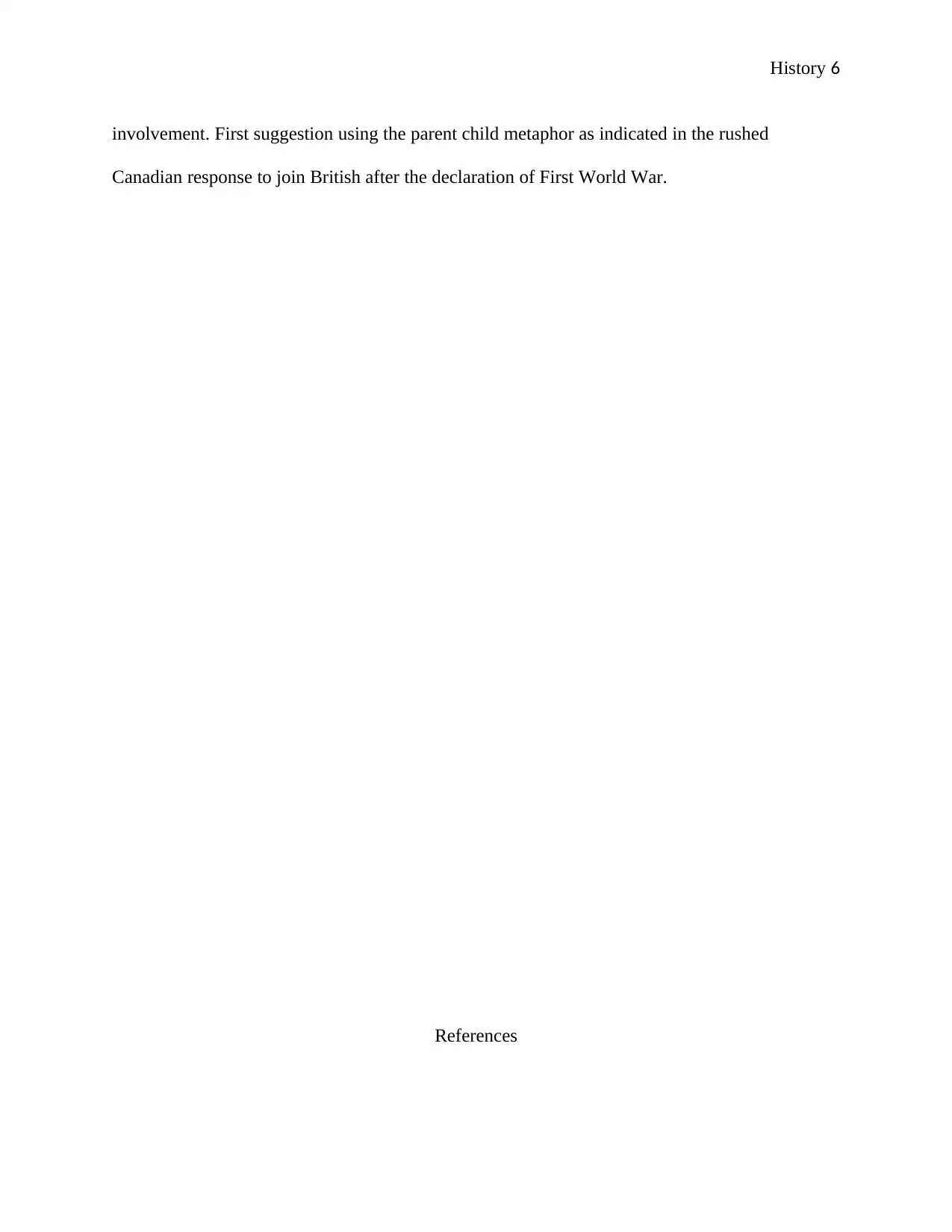
History 6
involvement. First suggestion using the parent child metaphor as indicated in the rushed
Canadian response to join British after the declaration of First World War.
References
involvement. First suggestion using the parent child metaphor as indicated in the rushed
Canadian response to join British after the declaration of First World War.
References
⊘ This is a preview!⊘
Do you want full access?
Subscribe today to unlock all pages.

Trusted by 1+ million students worldwide
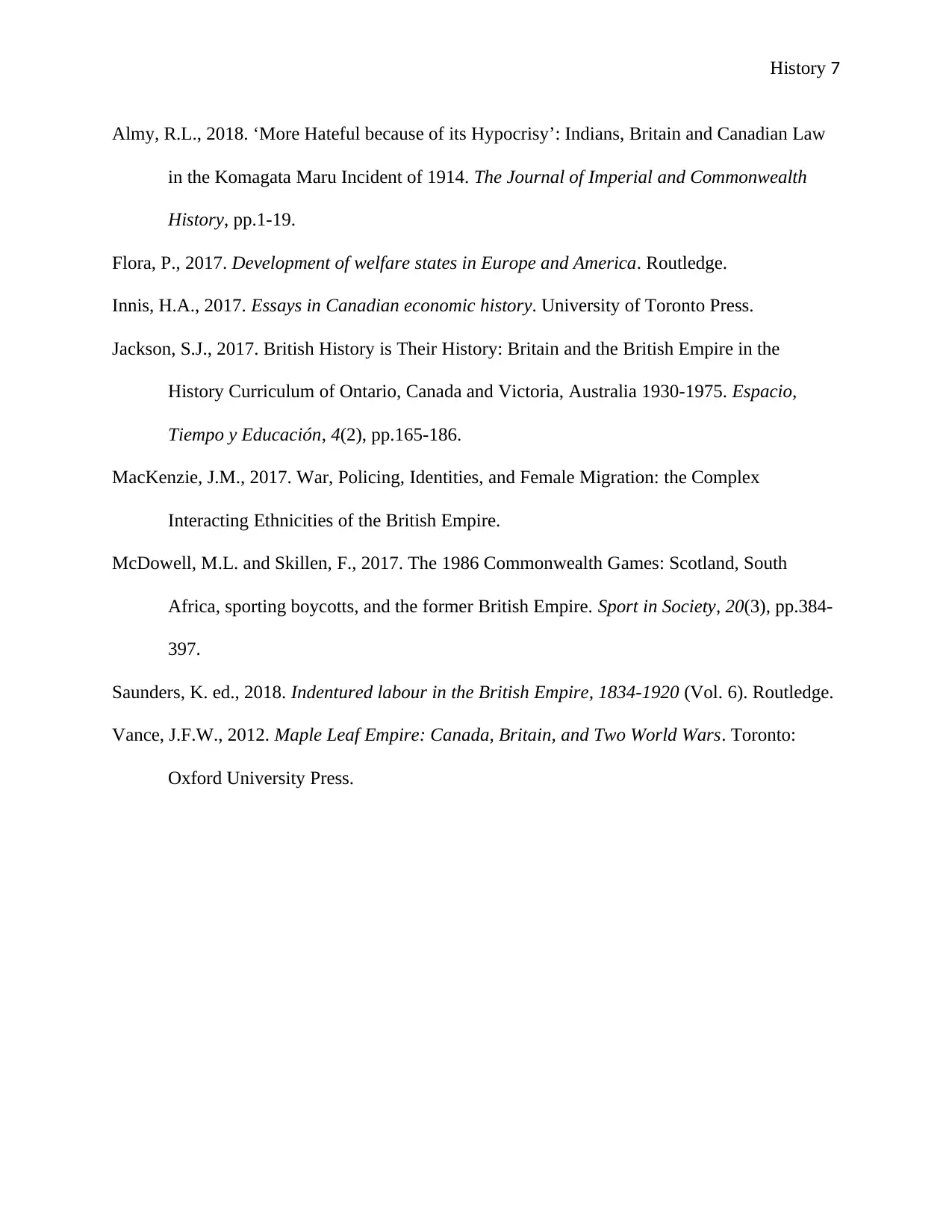
History 7
Almy, R.L., 2018. ‘More Hateful because of its Hypocrisy’: Indians, Britain and Canadian Law
in the Komagata Maru Incident of 1914. The Journal of Imperial and Commonwealth
History, pp.1-19.
Flora, P., 2017. Development of welfare states in Europe and America. Routledge.
Innis, H.A., 2017. Essays in Canadian economic history. University of Toronto Press.
Jackson, S.J., 2017. British History is Their History: Britain and the British Empire in the
History Curriculum of Ontario, Canada and Victoria, Australia 1930-1975. Espacio,
Tiempo y Educación, 4(2), pp.165-186.
MacKenzie, J.M., 2017. War, Policing, Identities, and Female Migration: the Complex
Interacting Ethnicities of the British Empire.
McDowell, M.L. and Skillen, F., 2017. The 1986 Commonwealth Games: Scotland, South
Africa, sporting boycotts, and the former British Empire. Sport in Society, 20(3), pp.384-
397.
Saunders, K. ed., 2018. Indentured labour in the British Empire, 1834-1920 (Vol. 6). Routledge.
Vance, J.F.W., 2012. Maple Leaf Empire: Canada, Britain, and Two World Wars. Toronto:
Oxford University Press.
Almy, R.L., 2018. ‘More Hateful because of its Hypocrisy’: Indians, Britain and Canadian Law
in the Komagata Maru Incident of 1914. The Journal of Imperial and Commonwealth
History, pp.1-19.
Flora, P., 2017. Development of welfare states in Europe and America. Routledge.
Innis, H.A., 2017. Essays in Canadian economic history. University of Toronto Press.
Jackson, S.J., 2017. British History is Their History: Britain and the British Empire in the
History Curriculum of Ontario, Canada and Victoria, Australia 1930-1975. Espacio,
Tiempo y Educación, 4(2), pp.165-186.
MacKenzie, J.M., 2017. War, Policing, Identities, and Female Migration: the Complex
Interacting Ethnicities of the British Empire.
McDowell, M.L. and Skillen, F., 2017. The 1986 Commonwealth Games: Scotland, South
Africa, sporting boycotts, and the former British Empire. Sport in Society, 20(3), pp.384-
397.
Saunders, K. ed., 2018. Indentured labour in the British Empire, 1834-1920 (Vol. 6). Routledge.
Vance, J.F.W., 2012. Maple Leaf Empire: Canada, Britain, and Two World Wars. Toronto:
Oxford University Press.
1 out of 7
Your All-in-One AI-Powered Toolkit for Academic Success.
+13062052269
info@desklib.com
Available 24*7 on WhatsApp / Email
![[object Object]](/_next/static/media/star-bottom.7253800d.svg)
Unlock your academic potential
Copyright © 2020–2026 A2Z Services. All Rights Reserved. Developed and managed by ZUCOL.
